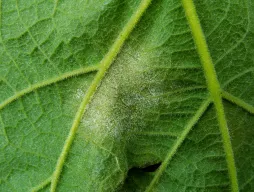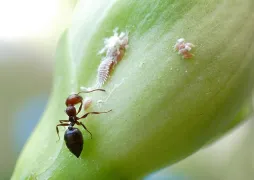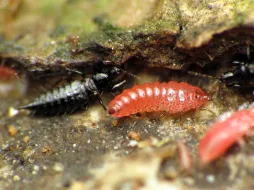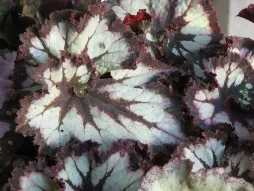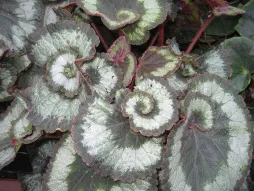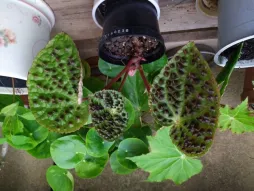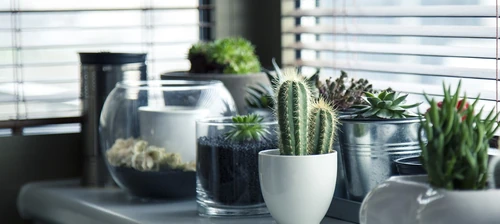Begonia maculata 'Wightii', the most popular Begonia maculata
With such original foliage, you might think that Begonia maculata 'Wightii' was born in a laboratory, after countless research, experiments and cross-breeding. Wrong! This variety, a hybrid of Begonia maculata, grows in the tropical forests of Brazil.
How to recognize Begonia maculata 'Wightii'?
Begonia maculata 'Wightii' is a rhizomatous plant with an upright habit. In the wild, it can reach a height of 1.5 meters. In pots and indoors, it rarely exceeds 50 centimetres.
Begonia maculata 'Wightii' belongs to the bambusiform category of begonias. Its stems have swollen nodes at regular intervals, like those of bamboo canes.
The long, narrow, oval leaves are studded with white or silver dots, so regular and well-drawn that you'd think they were painted by Japanese artist Yayoi Kusama. They contrast with the green limbs with their crimson undersides. Thick, waxy and smooth, the leaves tend to droop under their own weight.
If you're lucky, you'll see your begonia adorned with clusters of white flowers. But this bloom, more discreet than that of Begonia ×erythrophylla, often pales in comparison to the foliage.
Would you like to add a Begonia maculata 'Wightii' to your indoor jungle? Be aware that the plant is toxic to humans and animals. Ingested, it causes irritation of the mucous membranes and vomiting. And to avoid skin rashes, wear gloves when handling it.
Our maintenance tips
Begonia maculata 'Wightii' plants are tropical plants. They need high humidity but don't like wet foliage. You shouldn't mist them or water their leaves. And to keep their shape harmonious, remember to turn the pot a quarter turn every month.
Watering
Begonia maculata 'Wightii' plants are the enemy of excess water. Before giving your specimen a drink, always make sure the soil is at least five centimetres dry.
Like many plants, the plant prefers rainwater. But it's fine with tap water. Just make sure it's at room temperature.
During hot spells, water more regularly.
During hot spells, water more regularly.
Remove any water stagnating in the cup under the pot. It can rot the roots.
Spray
Your begonia maculata 'Wightii hates wet foliage. You must not mist the plant.
Repotting
In spring, transfer your Begonia maculata ‘Wightii’ to a larger pot, so that it can continue to grow.
Begonia maculata 'Wightii' plants like to be cramped. Re-pot when the substrate has become too poor or if the roots escape from the container. Choose a pierced terracotta pot two or three centimetres larger than the root ball. Line the bottom with a bed of clay balls for drainage.
Your plant needs a light, rich, draining substrate. You can use potting soil for green or flowering plants with a little perlite. Pour in a layer of soil and place your specimen in the center. Fill in with the rest of the mixture, tamp down and water for the first time.
To increase humidity, place your pot on a dish filled with moist clay balls.
Fertilization
You can stimulate the development of your plant during its growth phase, in spring and summer, with fertilizer.
Feed your Begonia maculata 'Wightii' with a fertilizer for green or flowering plants.
Prune
Cut flowering stems when wilted. Use a clean, sharp tool to prevent the spread of disease and promote healing.
You can prune begonia maculata 'Wightii to control its shape and development. Cut just below a node, at a 45° angle. Use clean, sharp scissors or pruning shears.
You can prune begonia maculata 'Wightii to control its shape and development. Cut just below a node, at a 45° angle. Use clean, sharp scissors or pruning shears.
Cutting
Cutting is carried out during the strong growth phase, generally in spring and early summer.
Take a fifteen-centimeter section of stem or liana with at least three leaves.
Soak your cutting in a glass of water at room temperature. Only the stem end should be immersed. Change the water every three days to keep it clear.
Place your cutting in a bright spot away from direct sunlight.
Place your cutting in a bright spot away from direct sunlight.
Diseases / Threats
Information
| Family | Begonias - Begoniaceae |
| Type | Begonia - Begonia |
| Species | Begonia maculata - Begonia maculata |
| Lifecycle | Perennial |
| Foliage | Evergreen |
| Exposure | |
| Substrat | |
| Planting method |
In pots |
| Categories | |
| Tags |
Fritillary Toxic |
| Origin |
South America |
| Hardiness (USDA) | 11b |
| Leaf color |
|
| Flower color |
|
Discover plants from the same family












